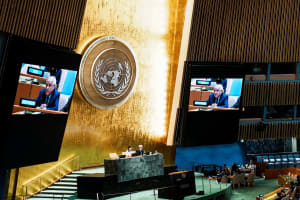Can the UN create a state?

The United Nations General Assembly’s recent vote on Resolution ES-10/23, granting the Palestinian Authority new “rights and privileges,” is being hailed in some quarters as a historic step toward statehood. With 143 nations voting in favor, the international body has sent a powerful political message. But a message is not statehood, and a vote is not sovereignty. This resolution, and the 2012 vote that granted Palestine “Non-Member Observer State” status, represent a profound and dangerous overreach by the UN—a deliberate attempt to circumvent both international law and the foundational principles of its own Charter to fabricate a state that does not, and has never, existed.
The core fallacy upon which this entire endeavor is built is the notion that a political vote in the General Assembly can bring a state into being. It simply cannot. Statehood is not a prize to be awarded by diplomatic consensus; it is a condition of fact, earned through the hard, tangible realities of governance, sovereignty, and control.
According to the established norms of international law, most notably the 1933 Montevideo Convention, a state must possess four definitive criteria: a permanent population, a defined territory, a government, and the capacity to enter into relations with other states. The entity referred to as “Palestine” fails demonstrably on at least three of these counts.
First, it lacks a defined territory over which it exercises sovereign control. The borders of any potential Palestinian state are entirely theoretical and the subject of intense negotiation. The territory it claims is bifurcated between Hamas-controlled Gaza and the Palestinian Authority-administered areas of the West Bank, with Israel maintaining overriding security control in the latter. There is no single, contiguous, or sovereign territory.
Second, and most critically, it lacks a single, effective government that exercises control. The schism between the Fatah-led PA in Ramallah and the Hamas terror organization in Gaza is absolute. They are two rival governments, one which has at times recognized Israel’s right to exist and one whose foundational charter is explicitly dedicated to its destruction. A state cannot exist with two separate armed authorities, two separate policies, and no unified command. This is not a government; it is a state of chaotic and violent division.
Third, as a direct result of this division, Palestine lacks the true capacity to conduct foreign relations. Its diplomatic efforts are fractured and contradictory, representing not a unified national interest but the competing agendas of two warring factions. True sovereignty in foreign policy is impossible when a government cannot speak for, or control, all the people and territory it claims to represent.
Despite these undeniable facts, the UN General Assembly voted in 2012 to bestow upon this non-state the title of “Non-Member Observer State.” This was a legal and logical absurdity. The status itself is predicated on the entity being a state. By granting this status, the Assembly engaged in a circular fiction: it pretended Palestine was a state to justify giving it the status reserved for states, thereby creating the illusion that it must be one.
This was not a recognition of fact but an act of political creationism, and it was done in direct contravention of the UN’s own rules. The UN Charter is explicitly clear: membership—and by extension, the privileges associated with statehood—is open to “peace-loving states.” How can an entity be deemed “peace-loving” when one of its two governing powers is a US- and EU-designated terrorist organization that launched a brutal war on October 7th, and whose leaders continue to openly call for genocide against Jews? The UN’s vote is not just wrong; it is a parody of its own principles.
This illogical bestowal of unearned status has had dangerous consequences, chief among them being the Palestinian Authority’s attempt to use this faux statehood to wage lawfare against Israel at the International Criminal Court (ICC). This, too, is a fallacy built on the UN’s initial error.
The ICC is a court for states. The Rome Statute allows for the ICC to exercise jurisdiction over crimes committed on the territory of a “State” that has accepted the Court’s jurisdiction. Palestine, after being granted its illegitimate observer status in 2012, acceded to the Rome Statute in 2015. It then presented itself to the ICC as a state, using the UN’s own political vote as its primary credential.
This is a catastrophic perversion of justice. The ICC Prosecutor, by accepting this premise, is effectively allowing a political body—the UN General Assembly—to determine the jurisdiction of a judicial body. It sets a terrifying precedent: any non-state actor can lobby for a symbolic vote at the UN and then use that vote to drag its adversaries into a international court. It politicizes international law and weaponizes it against the world’s only Jewish state, all while being based on a complete legal fiction.
The proper path to statehood is not, and has never been, through the hallways of the United Nations in New York. It is through direct negotiations between the parties involved. This is the consistent and legally sound position of the United States and Israel. Statehood must be the culmination of a peace agreement that resolves final-status issues: secure and recognized borders, Jerusalem, refugees, and security arrangements. These are complex, sensitive issues that require compromise and mutual recognition at the negotiating table, not diktats from an assembly of nations with no stake in the outcome.
The UN’s attempt to shortcut this process is not an act of peacemaking; it is an act of sabotage. It tells the Palestinian leadership that they can achieve their goals without making the difficult compromises necessary for peace, without recognizing Israel as the Jewish state, and without reconciling their own internal divisions. It rewards intransigence and punishes diplomacy.
The overwhelming number of votes in favor—143—is not proof of the move’s legitimacy, but rather evidence of the deep-seated institutional bias against Israel within the UN system. For decades, Israel has been the subject of a disproportionate and obsessive number of condemnations. It is the only nation with a permanent standing agenda item at the Human Rights Council. This latest resolution is not about justice or law; it is the culmination of a long-standing political campaign to isolate and delegitimize Israel, using the Palestinian issue as its vehicle.
In conclusion, the United Nations cannot create a state. It can only recognize what already exists. By attempting to anoint “Palestine” as a state through a political vote, the UN is engaging in a dangerous fantasy that undermines its own Charter, corrupts international law, and grievously harms the prospects for a genuine, negotiated peace. The state of Palestine will only be legitimate when it is born from an agreement with Israel, when it has a single, government that controls its territory and disavows terror, and when it exists as a true partner for peace rather than a fictional construct of the General Assembly. Until that day comes, the world must reject this diplomatic charade for what it is: a politically motivated fallacy that moves the cause of peace further away than ever before.

Aurthur is a technical journalist, SEO content writer, marketing strategist and freelance web developer. He holds a MBA from the University of Management and Technology in Arlington, VA.
You might also like to read this:

















